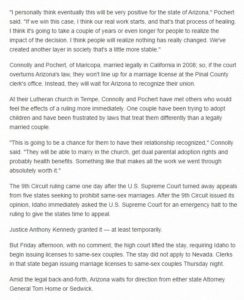 “I personally think eventually this will be very positive for the state of Arizona,” Pochert said. “If we win this case, I think our real work begins, and that’s that process of healing. I think it’s going to take a couple of years or even longer for people to realize the impact of the decision. I think people will realize nothing has really changed. We’ve created another layer in society that’s a little more stable.”
“I personally think eventually this will be very positive for the state of Arizona,” Pochert said. “If we win this case, I think our real work begins, and that’s that process of healing. I think it’s going to take a couple of years or even longer for people to realize the impact of the decision. I think people will realize nothing has really changed. We’ve created another layer in society that’s a little more stable.”
Connolly and Pochert, of Maricopa, married legally in California in 2008; so, if the court overturns Arizona’s law, they won’t line up for a marriage license at the Pinal County clerk’s office. Instead, they will wait for Arizona to recognize their union. At their Lutheran church in Tempe, Connolly and Pochert have met others who would feel the effects of a ruling more immediately. One couple have been trying to adopt children and have been frustrated by laws that treat them differently than a legally married couple.
“This is going to be a chance for them to have their relationship recognized,” Connolly said. “They will be able to marry in the church, get dual parental adoption rights and probably health benefits. Something like that makes all the work we went through absolutely worth it.”
The 9th Circuit ruling came one day alter the U.S. Supreme Court turned away appeals from five states seeking to prohibit same-sex marriages. After the 9th Circuit issued its opinion, Idaho immediately asked the U.S. Supreme Court for an emergency halt to the ruling to give the states time to appeal.
Justice Anthony Kennedy granted it – at least temporarily. But Friday afternoon, with no comment, the high court lifted the stay, requiring Idaho to begin issuing licenses to same-sex couples. The stay did not apply to Nevada. Clerks in that state began issuing marriage licenses to same-sex couples Thursday night.
Amid the legal back-and-forth, Arizona waits for direction from either state Attorney General Tom Horne or Sedwick.
References:
- Need citations
Leave a Reply